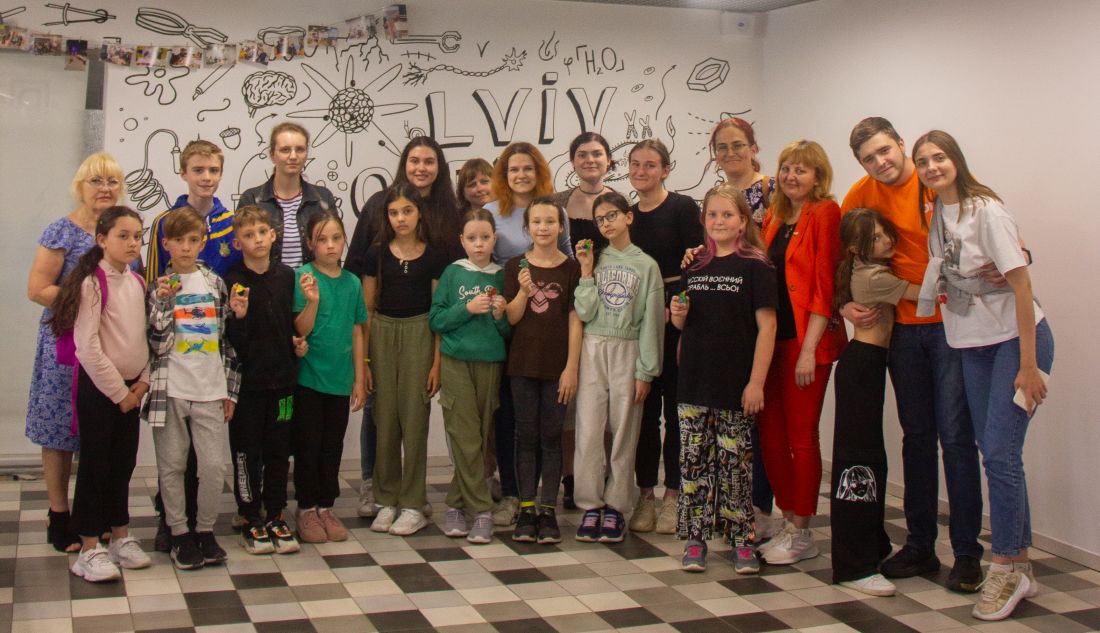On the eve of March 8 – International Day of Struggle for Women’s Rights – we want to support Ukrainian women who, during this devastating war, began to implement changes in Ukraine and became its strong rear.
Successful women are always inspiring: self-confident, strong, and independent. Every day, we see them around us, so fragile and unique, who are now creating the latest history. After surveying partner NGOs that work with the ICF “Alliance for Public Health” in the humanitarian field, we saw that this domain has a female face: 72% of the employees of such organizations are women, and only 28% are men. Today, we want to introduce you to a small part of these extraordinary Ukrainian women who work in the humanitarian field with great inspiration and love, combining career and personal life.
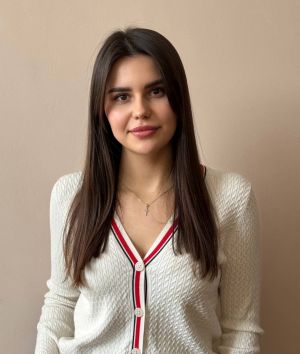 Anastasia Dyachkovska, coordinator of projects of the PO “Alternative”, Odesa region.
Anastasia Dyachkovska, coordinator of projects of the PO “Alternative”, Odesa region.
I became interested in humanitarianism when I volunteered at a public organization in 2018. At that time, I was getting a higher education, but I realized that I like social work. I gradually began to get involved in the activities: in 2022, I was interested in a humanitarian project, and in 2023, I was entrusted with a critical mission – I became the project coordinator and regional facilitator of initiative groups working in the Odesa region.
During my work as a facilitator, I got to know many volunteers and together we created the initiative group “Mothers of Many Children”. This is a rather vivid example of the grouping of internally displaced persons from many regions of Ukraine. Realizing that it is tough for women with many children to find work in Odesa, they united and created a children’s center where their children can stay during working hours. Currently, there are about 50 children of various ages. For many IDP women, this is a way out of a difficult situation because now they can work and provide for their primary needs. The center hosts educational events, master classes, and school preparation classes – these women offer all this.
Unfortunately, active hostilities continue in the Odesa region; the situation with shelling is relatively unstable; most men either went to the front or changed their residence due to active mobilization. Therefore, during the war, women began to take on men’s responsibilities and perform men’s work. For example, in our PO “Alternative”, only one man works now; all other employees are women. We women also do hard physical work, such as distributing food packages. But we do it with pleasure because we understand that humanitarian activities are essential for Odesa, as in 2024, funding has been dramatically reduced, and there is not enough money to provide for the primary needs of the residents of the region. Now, the head of the organization and I have an idea we want to implement – it is the opening of a kitchen for people who do not have money for food or cannot cook it.
Personally, I get a lot of inspiration from helping people. When I see people coming to us for humanitarian aid, food packages with their families, small children – how grateful they are and how much they need it – I understand that we are doing vital work. Looking into their happy eyes, I know I am in the right place and should do what I do!
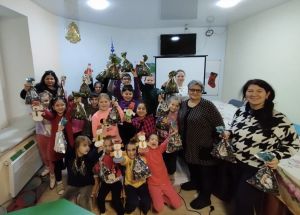
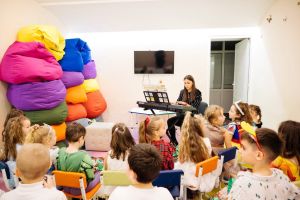
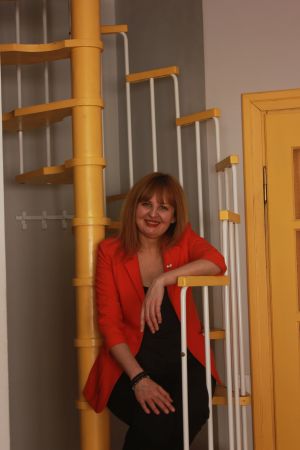 Victoria Bobrynok, director of the “Safe Place” shelter, Lviv.
Victoria Bobrynok, director of the “Safe Place” shelter, Lviv.
At the beginning of the war, I, like many Ukrainians, was forced to leave my home due to the occupation of my city and acquired the status of a displaced person. I have personally experienced all the troubles and pain experienced by displaced people, starting from psychological trauma and ending with thinking about where to live and what to feed the children. When my children and I arrived in Lviv at the train station, we were offered temporary accommodation in the school premises, where we had to sleep on cots in the gym. As a self-sufficient person, it was tough for me to accept this because I was worried about my psychological health and the health of my children. I found a home for us, but the thought stuck in my head: how hard it is for us (displaced people) now. We are thrown out of life and need to do something urgently to help. Before the war, in my community, I headed several condominiums, worked as a school director, and was a local council deputy – I have an active position in life. These organizational skills and enthusiasm helped me in my new position: first, I created the “Tokmak in Lviv” community, and later, when the Alliance and I found each other, I headed the “Safe Place” shelter.
At that time, there was an urgent need to create a shelter with appropriate conditions for IDPs. In the shortest possible time, a shelter was opened in the center of Lviv with standard furniture, orthopedic mattresses, snow-white bed linen, and restrooms. We not only create comfortable conditions for people to stay in the shelter but also provide a wide range of essential services, such as psychological and legal support, the assistance of a social worker in finding housing, informational and educational events and workshops for faster socialization and integration of IDPs into a new life.
During the shelter’s operation, we started the “Safe Place” children’s camp aimed at children from the front-line zone. We also have a Social Assistance Hub and a camp for future IT-related professions. Now, I have another idea that I plan to implement – to start a school of occupations in the medical field. This is a significant direction, and I want our children to have the opportunity to study and get to know the profession better by attending various meetings and excursions in medical institutions.
The staff of our shelter consists of 100% IDP women, and, unfortunately, all of us have our own homes under occupation. And no matter how difficult it is for us, performing both men’s and women’s work, we know that we are in our place here; this is our calling. When you like what you do, you start to initiate changes, you get “fired up” with ideas, you always try to improve something, and the more you do, the more resources you have to do more. The best thanks for me are those smiles from people when they are already settled and writing me, “Thank you for giving us a second life.” It is very inspiring and empowering!
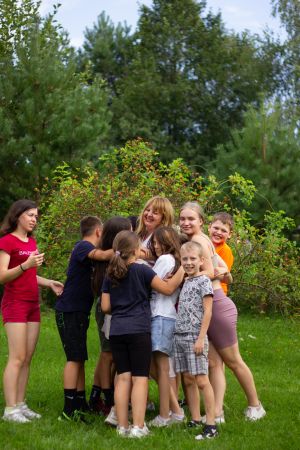
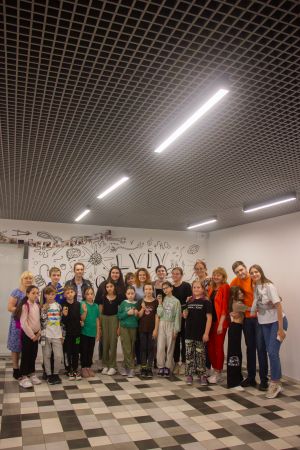
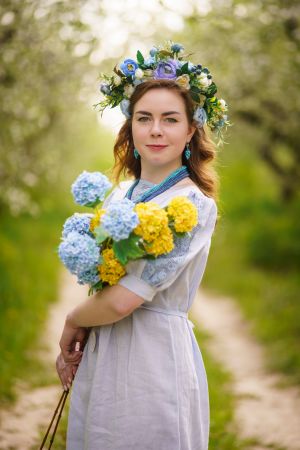 Kateryna Horbyk, volunteer, and coordinator of humanitarian projects “Side by Side” and “Social Wardrobe”, Poltava
Kateryna Horbyk, volunteer, and coordinator of humanitarian projects “Side by Side” and “Social Wardrobe”, Poltava
From the beginning of the war, I realized that besides my primary work, I would devote much time to the humanitarian field. When I discovered that the war would drag on, I wanted to support people and help more. And we, together with a team of volunteers, created a social wardrobe. This is our small contribution, which has become essential for the region’s residents.
With the support of donors, we receive clothes, hygiene products, and goods for children from abroad. At first, we distributed this help in communities, but later, the idea arose to structure it and make it possible for more people to receive these services. There was a need for things and it is not going anywhere. And before the beginning of the autumn-winter season, we understood that people would come, so we started preparing in advance for another problematic autumn and winter. In the premises of one of the warehouses, the work of the social hub was organized so that people who would come here for things could calmly choose what they needed, avoiding queues and crowds. We needed to create comfortable conditions for customers, primarily for mothers with small children and people with disabilities.
Everyone related to the work of the social wardrobe is engaged in it on a volunteer basis in their free time. In today’s realities, when men have been forced to stand up for the country’s defense, women have taken on a leadership role and do a lot of men’s work, such as unloading humanitarian aid vehicles. So far, our “women’s” team has distributed more than 180 tons of humanitarian aid. Starting in June 2023, during the seven months of the social wardrobe operation, 1,370 people from various categories of the population received help: IDPs, residents, families of military personnel, people with disabilities, and other vulnerable categories. Now, in the cold season, people are incredibly grateful for bed linen, pillows, and blankets. They don’t have anything to sleep on; they lack the usual basic things. Many pregnant women come, taking clothes and necessary things for their future children. The social wardrobe is not a one-time help; it can be used once a month. We had to set such a deadline due to high demand. We want to help everyone, but all our customers must be on equal terms.
Now, I am very inspired by my work because when you do something for others, there is a feeling of warmth inside. We women are very empathetic, and I understand that I cannot stop. When I see people who have lost their homes, relatives, and their usual lives – I try with all my might to help them, often investing my resources. But I can say frankly: I never doubted for a second that I was in my place!
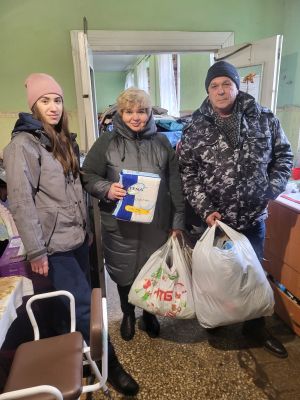
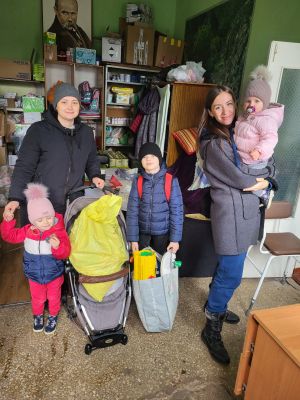
For 23 years, the ICF “Alliance for Public Health” team has been helping to gain access to prevention, diagnosis, and treatment of HIV, hepatitis, and tuberculosis, protecting people’s rights, and providing humanitarian support. After the start of the full-scale invasion, the foundation responded to the needs of Ukrainians with a wide range of humanitarian initiatives. In the first months of the war, together with more than 100 regional partners in Ukraine, the Alliance launched humanitarian activities in all areas of the territory under the control of the country and, in a short time, became an expert in this field, attracting more than 70 million UAH for the needs of ordinary people who suffer the most from the war. Evacuation, humanitarian aid, food, essential health services, drug delivery and diagnostics, mental health support, heating, uninterrupted nutrition, shelters and housing for internally displaced persons, ongoing human rights support through the REAct mechanism, online support (24/7) through HelpNOW became available for Ukrainian refugees in 51 countries of the world thanks to the implementation of humanitarian initiatives of the Alliance.
Additional Information:
In 1975, the UN officially announced that March 8 would be celebrated as International Women’s Day or the Day of the Struggle for Women’s Rights. Women’s Day is celebrated worldwide in different ways: in some countries at the level of a public holiday, in others – socially or locally. The UN celebrates the date in connection with women’s rights. In some parts of the world, the IWD still reflects its political origins, marked by protests and calls for radical change; in others, especially in the West, it is mainly sociocultural and focused on celebrating femininity.

